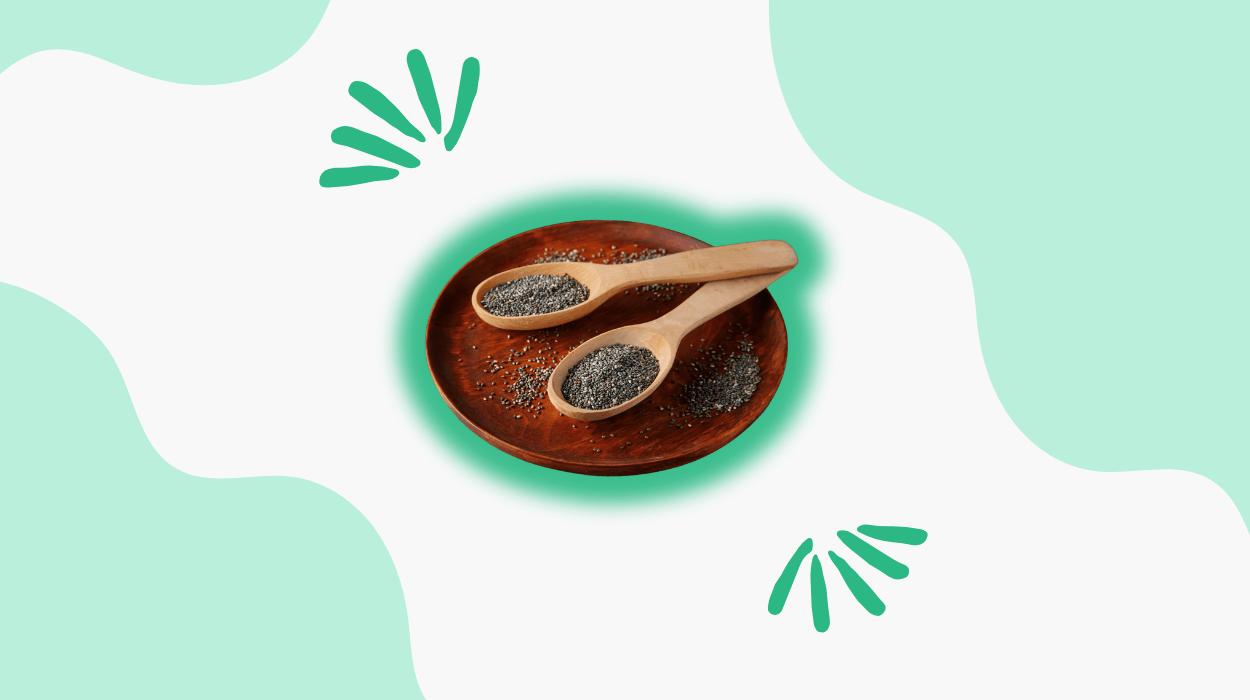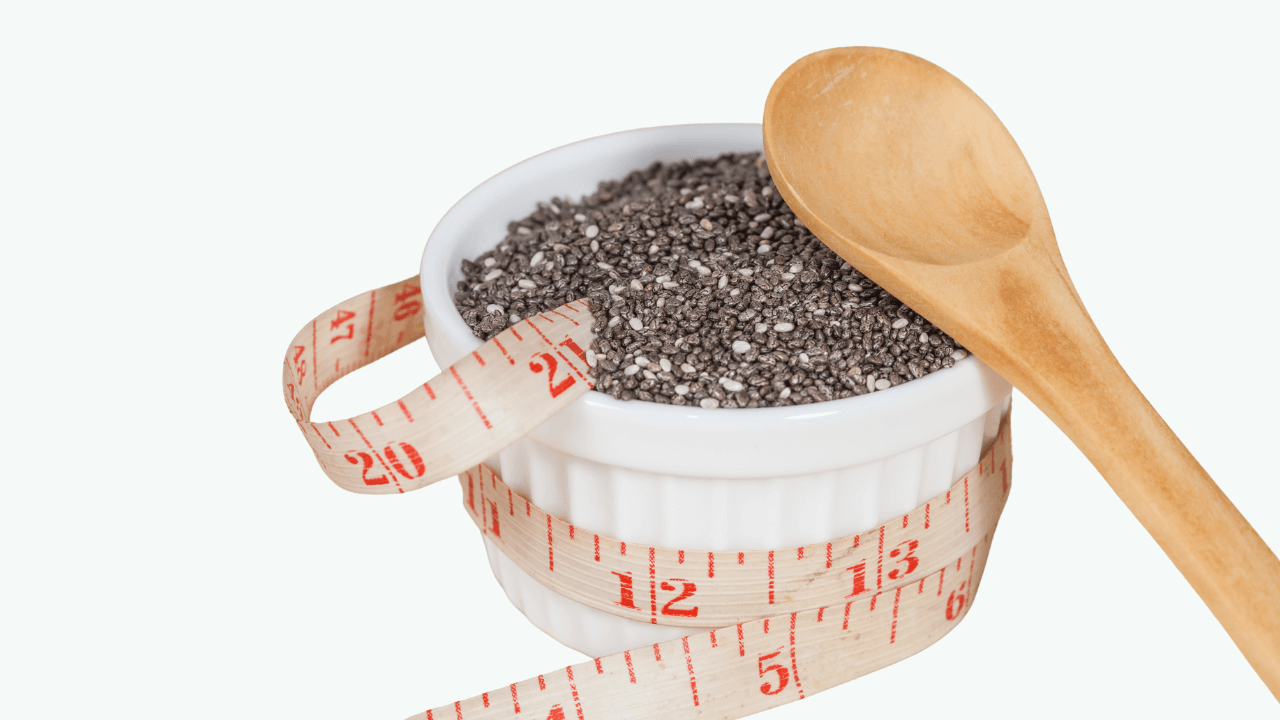

Chia seeds have a high fiber content, which may help improve irregular bowel motions by relieving constipation symptoms.
These seeds might help improve nutrient absorption and increase the production of beneficial bacteria in the gut, supporting healthy digestive function.
Chia seed’s ability to affect the gut microbiota and reduce the bioaccessibility of lipids, cholesterol, and glucose highlights its potential to promote overall digestive health.
These tiny chia seeds could be a versatile and nutrient-rich option to combine in your diet by adding them to smoothies, salads or consuming them as sprouts.
Chia seeds, originating from the Salvia hispanica L. plant, are tiny black and white seeds similar in size to poppy seeds that offer a rich nutritional profile, including a good amount of fiber, calcium, magnesium, phosphorus, and potassium.

Research has shown that chia seeds could improve the thickness of intestinal muscle layers, thereby improving overall intestinal function. This enhancement could potentially lead to better nutrient absorption and digestion.
Studies also revealed that chia seeds have the ability to increase the surface area, length, and width of villi in the small intestine. Villi are essential for maximizing the absorption of nutrients from food, and by enhancing their structure, chia seeds can contribute to better nutrient uptake.
Chia seeds could increase the production of goblet cells, specialized cells that line the intestines. These cells could help maintain the integrity of the intestinal wall, further supporting overall intestinal health.
Studies suggest that chia seeds can help improve the growth of good gut bacteria such as Enterococcus spp and Lactobacillus spp. These microbes are essential for digestion and overall gut health, highlighting the potential of chia seeds in promoting healthy intestinal microbiota.
Chia seeds, with their high fiber content, may help prevent constipation due to their potential laxative effect. They contain approximately 30-34 grams of fiber per 100-gram serving, making them a rich source of dietary fiber.
Chia seeds may help absorb a significant amount of fluid, forming a gel-like consistency. This gel-forming property could add bulk and weight to stools, softening them and allowing them to pass more easily through the digestive system.
The fiber in chia seeds is a natural laxative, promoting regular bowel motions and preventing constipation. This gentle laxative effect can help maintain digestive health and alleviate issues related to irregularity.
Chia seeds contain high alpha-linolenic acid, an omega-3 fatty acid with anti-inflammatory properties. These seeds could help reduce gut inflammation and alleviate symptoms associated with inflammatory conditions.
Chia seeds contain caffeic acid, a potent antioxidant with anti-inflammatory effects, which helps reduce inflammation in the gastrointestinal tract.
These seeds are low in fermentable oligosaccharides, disaccharides, monosaccharides, and polyols (FODMAPs), making them suitable for people with irritable bowel syndrome (IBS).
Chia seeds may enhance gut health due to their rich fiber content and omega-3 fatty acids. These nutrients may contribute to the promotion of a healthy gut environment by promoting the population of good bacteria while reducing the presence of harmful bacteria.
Chia seeds could help improve the integrity of the gut lining, which protects against pathogens and toxins, ultimately preventing them from entering the body.
The fiber found in chia seeds works as a prebiotic, nurturing the good bacteria in the gut. Omega-3 fatty acids in chia seeds have anti-inflammatory properties that may help reduce gut inflammation, further supporting gut health.
Recommended:
To make chia pudding, mix ¼ cup of chia seeds with one cup of liquid such as almond milk, soy milk, dairy milk, or 100% fruit juice.
Allow this pudding mixture to rest in the refrigerator for a minimum of 15 minutes for a pudding-like texture. You can mix nuts, chopped fresh fruits, or a sprinkle of cinnamon for added flavor and consistency.
Chia sprouts can be grown at home by placing chia seeds in a single layer on a terracotta saucer or unglazed clay dish. You must ensure enough space for growth by using only about a teaspoon of seeds.
Spray the chia seeds with water daily and cover them with plastic wrap or a clear glass dish. It is crucial to keep the seeds moist throughout the sprouting process.
Put the chia sprouts in a sunny location to facilitate growth because adequate sunlight is essential for germinating seeds and developing into healthy sprouts.
After approximately 3-7 days, vibrant green sprouts might appear. At this stage, the chia sprouts are ready to be harvested and used to garnish various dishes such as salads and sandwiches or as a topping.
Chia seeds show impressive water-absorbing capabilities, soaking up liquid up to 10 times their weight.
To make chia gel, combine ¼ cup of chia seeds with 1 cup of fluid (such as water or juice). Mix thoroughly and let it rest for approximately 15-20 minutes until it becomes soft gelatin.
After achieving the desired gel-like texture, store the chia gel in the refrigerator. It could be kept for up to one week, allowing for convenient use in various recipes.
You could also include chia gel into your diet by adding it to smoothies or vegetable soups. It could enhance your meals’ nutrient content and contribute to a thicker, more satisfying consistency.
Chia seeds could be a suitable option for people dealing with stomach issues like bloating, irregular bowel movements, and poor gut health. It may help provide essential fiber in your diet, supporting optimal gut and digestive health.
It is not ideal to depend solely on chia seeds for the optional fiber intake. You can also include a variety of plant foods like vegetables, fruits, beans, whole grains, nuts, and seeds, which could provide a broader spectrum of nutrients and support overall digestive health.
However, excessive intake of chia seeds could cause stomach problems, low blood pressure levels, and allergic reactions in some people.
Thus, if starting with your chia consumption, try smaller amounts and avoid consuming more than two tablespoons of chia seeds daily.
Tyler Read earned an undergraduate academic degree from Sonoma State University, California and is a certified personal trainer (CPT) with NASM (National Academy of Sports Medicine). With over 16 years of experience, Tyler has trained clients both online and in-person.
He is passionate about helping others turn their love for fitness into a career. Tyler has worked with many local and commercial gyms before establishing his successful private personal training business, which he continues to operate.
